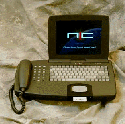 it,
what the new Enterprise will look like, and how much it cost.
it,
what the new Enterprise will look like, and how much it cost. [rant] Watching "Gone with the Wind' last night on Turner's TBS, an Atlanta based station. Perhaps because the station is based in an entirely different part of the country, I found the advertisements to be hilarious. A Denny's ad which advertises bacon and apologizes to "Babe", a car hitting on a middle aged woman "OoooHyeahh", and others.
I'm under the impression that, a majority of the time, TV ads make very little impression on me, but if I'm lazy enough to not switch channels when they come on, they've probably got my full attention since they totally fill the screen -- something web advertising won't have for years.
First look at ESPNet, a site which was among the first to sport significant advertising. On a 640x480 screen, the banner ad for Pacific Bell does fill a good third of the screen, on a 1024x768 monitor, it'll be much less. Either way, there is absolutely no reason that you need to look at the ad because it doesn't take over your monitor.
Animated GIFs have given advertisers a leg up attracting our attention with movement inside of their ads, but there remains a larger fundamental problem: advertising must change to exist on the net.
The Internet makes us information empowered. There is no need to watch
ABC to see an ad for the new Star Trek movie is coming out since you've
been visit Star Trek sites for months and not only do you know when it
opens, you also know who is starring in  it,
what the new Enterprise will look like, and how much it cost.
it,
what the new Enterprise will look like, and how much it cost.
Some prime examples of this empowerment are two of the biggest software hits in history, Netscape and Quake. Neither product advertised their wares, they simply designed a best of breed product and let the consumer figured it and tell a friend.
Advertisers are making strides to addresses this lack of exposure. Some sites are making advertising more intrusive to the web experience, but the web populace is a finicky lot. The likelihood that a site which forces a user to hurdle through advertising to get to the content is a going to be successful will depend entirely on the value of the content.
[rant] Two industrial heavyweights apparently have the answer to the question, "How are we going to get the entire country on the Internet?" Both Sun Microsystems and Oracle have embraced the trendy idea of thin computing as a means of getting into a pool thought completely filled with the Microsoft/Intel monopoly.
Here's how it works. Joe Consumer goes to Frys and purchases the hardware,
a scaled down PC in the realm of $200 to $1000 -- the low price achieved
by using older technology.  Once
home, Joe Consumer plugs his thin computing device into the wall and connects
to the Fat Server which is run a company similar to today's Internet Service
Provider.
Once
home, Joe Consumer plugs his thin computing device into the wall and connects
to the Fat Server which is run a company similar to today's Internet Service
Provider.
The concept behind the Fat Server is that this is where all the computing power needs to be. Ultra-powerful servers act as the workhorse in the thin computing model, an idea obviously attractive to companies like Sun and Oracle who have already made their millions selling beefy servers to the enterprise.
Being a computing speed snob, the thin computing idea doesn't fly to far with me. While the market of the average consumer is likely benefit from a simplified Internet device, most of the people in the Bitsifter Circle would never give up their Pentium Pro with 4.2 gigabytes of hard drive storage and 4 more megabytes of memory on the video card -- they wouldn't be able to play Quake at a decent frame rate.
The Internet isn't ready for thin computing, either. With the growing presence of rich multimedia web pages on the net, the amount of computing cycles to just display a page with embedded video, sound, and Java isn't decreasing, it's growing exponentially. Even these types of pages on internal nets are sluggish and that’s without the noise of the rest of the world. The theory that yesterday’s technology can be sold to manage tomorrow’s applications borders on the ludicrous.